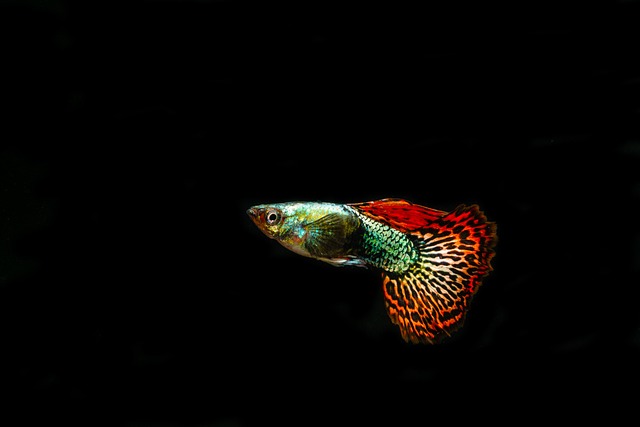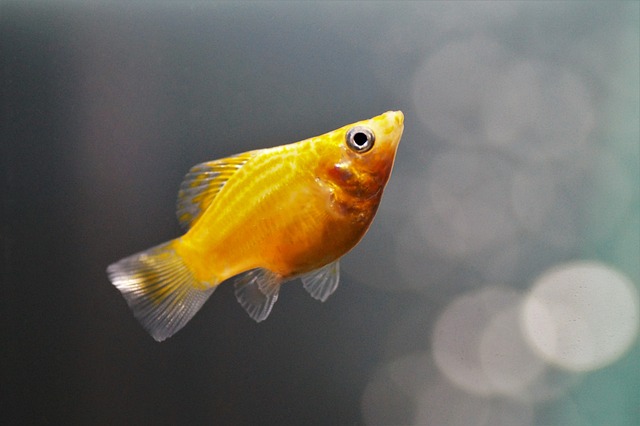Guppies tend to be more active than mollies and require more maintenance, while mollies prefer cooler water temperature and can survive in a variety of habitats. Both species thrive in an aquarium environment when cared for properly.
What is a guppy?
(Image by còi photograper lê from Pixabay )

A guppy is a small, brightly coloured fish that is popular in home aquariums. Guppies are easy to care for and can live in a wide range of water conditions. These cheerful fish are known for their long fins and tails, which can make them look like miniature angels swimming in your tank.
What is a molly?
(Image by ivabalk from Pixabay )

Mollies are a type of fish that is often kept as a pet. They are small and can be a variety of colors, including black, silver, white, and gold. Mollies are easy to care for and can live in both fresh and salt water.
The difference between guppy and molly
Guppies and mollies are both popular freshwater fish among aquarium enthusiasts. Though they are similar in some ways, there are also several key differences between the two species.
Guppies are much smaller fish than mollies. A typical guppy will only grow to be about 2 inches long, while mollies can reach up to 4 inches in length. This size difference is important to consider if you’re planning on keeping both types of fish together in the same tank.
Another key difference is in their reproductive habits. Guppies give birth to live fry (baby fish), while mollies lay eggs that must be fertilized by a male before they hatch. This means that you’ll need to have at least one male and one female of each species if you want them to reproduce.
Guppies are also known for being relatively easy to care for, while mollies can be a bit more high-maintenance. Mollies, for example, require salt in their water to thrive, whereas guppies do not. This is something else to keep in mind when deciding which type of fish is right for you and your aquarium setup.
Why you should choose one over the other
If you are looking for a smaller, more low-maintenance fish for your home aquarium, then the guppy is the fish for you. Guppies are also livebearers, meaning they will give birth to live young rather than eggs. However, if you are looking for a more colorful fish, then the molly is the way to go. Mollyfish come in a variety of colors and patterns, making them a beautiful addition to any aquarium.
Can guppy live with molly?
Yes, but there are a few things to keep in mind. First, because mollies prefer saltier water, you’ll need to make sure the tank is big enough to accommodate both fish (and has the proper filtration system). Second, you’ll need to feed your molly a high-quality diet of live foods and plants; otherwise, it could become sick or die. Guppies are less finicky eaters and can do well on a standard flake food diet. Finally, because mollies give birth to live young, you’ll need to provide plenty of hiding places for the fry (baby fish) to avoid being eaten by their larger tankmates. With proper care and consideration, guppy and molly can thrive together in the same aquarium!
Why is my molly attacking my guppy?
Mollies and guppies are both peaceful fish that can coexist in the same aquarium. However, there are a few reasons why your molly might be attacking your guppy.
One reason could be that the molly is simply territorial and is trying to establish its dominance over the other fish in the tank. If this is the case, you may see the molly chasing and nipping at the guppy’s fins.
Another possibility is that the molly is attracted to the guppy’s long fins and vibrant colors. In some cases, mollies will nibble on the fins of other fish as a way of showing their affection. While this behavior is usually harmless, it can sometimes lead to serious injury if the molly continues to bite or chew on the guppy’s fins.
If you notice your molly attacking your guppy, it’s important to closely monitor their interactions and take steps to separate them if necessary. By providing each fish with its own space and plenty of hiding places, you can help reduce aggression and promote a more peaceful environment for all your fish.
Can a guppy and a molly have babies?
Yes, a guppy and a molly can have babies. In fact, they are often bred together because they produce such beautiful offspring. The fry (baby fish) are usually born healthy and thrive in aquariums with both species present.
Mollies
Do mollies lay eggs or fish?
Mollies are a type of fish that can lay either eggs or live young, depending on the species. Some molly species will also give birth to fry (baby fish). In general, mollies are livebearers, meaning they give birth to live young rather than laying eggs.
How long do mollies live?
Mollies are a type of fish that can live for a long time if they are well cared for. The average lifespan of a molly is about 3-5 years, but some mollies have been known to live up to 10 years. The key to keeping your molly healthy and happy is to provide them with a clean and spacious tank, plenty of hiding places, and a good diet.
How big do mollies get?
Mollies are a type of fish that can grow to be quite large. The average size of a molly is about four inches, but some mollies can grow to be six inches or more. If you are looking for a fish that will stay relatively small, then a molly might not be the best choice.
How many months is a molly fish pregnant?
Molly fish are livebearers, meaning they give birth to live young rather than laying eggs. They are pregnant for approximately 6-8 weeks, during which time they will grow increasingly round as their fry (baby fish) develop. After 8 weeks, the fry will be born anywhere from 20-60 at a time.
Can molly live with goldfish?
Goldfish and Molly Fish can live together since they are both freshwater fish. Goldfish tend to be a little bit larger than Molly Fish, so you will need to take that into account when stocking your aquarium. You will also want to make sure that you have enough hiding places for your Molly Fish, as Goldfish can be a bit nippy.
Are mollies good beginner fish?
Mollies are a great beginner fish because they are very hardy and can tolerate a wide range of water conditions. They are also relatively easy to care for and are not as delicate as some other fish species. Mollies are also relatively peaceful, which makes them a good choice for beginners who do not want to deal with aggression from their fish.
Can molly fish live without oxygen?
Mollies are a type of fish that can live in either fresh or salt water. They are known for their ability to survive in low-oxygen environments and can often be seen in ponds and streams with very little water movement. Guppies, on the other hand, are a type of freshwater fish that require high levels of dissolved oxygen in order to survive. They are often found in fast-moving rivers and streams where there is a constant supply of fresh, oxygenated water.
Can molly fish give birth without male?
Molly fish are capable of giving birth without a male present. This is called parthenogenesis, and it results in all-female populations of molly fish. Parthenogenesis occurs when an egg develops into a healthy offspring without being fertilized by a sperm. This can happen spontaneously or be induced artificially. In the wild, parthenogenesis is rare and usually only happens in populations that are isolated from males for long periods of time. However, in captivity, molly fish can easily become all-female due to the lack of available males.
Guppies
How many guppies should be kept together?
The ideal number of guppies to keep together varies depending on the size of your tank, but generally, it is best to keep at least 5-6 guppies together. This allows them to socialize and form a hierarchy. If you have a smaller tank, you may need to keep fewer guppies together.
How long do guppys live?
Guppies are one of the longest-lived freshwater fish, with a lifespan of up to 8 years. In the wild, they often live shorter lives due to predators and other environmental factors. Molly fish have a shorter lifespan of only 3-5 years.
How big do guppy’s grow?
Guppies only grow to be about 2.5-3 inches long at most. So if you’re looking for a fish that will stay relatively small, a guppy is probably your best bet.
How fast do guppies multiply?
Guppies are livebearers, which means they give birth to live young rather than hatching from eggs. They can start reproducing when they reach 4 to 6 weeks old and will continue having babies throughout their lifetime, which is typically 2 to 3 years. Each pregnancy results in 5 to 25 baby guppies, with larger females usually giving birth to more offspring.
Do guppies need live plants?
Live plants provide shelter and hiding places for guppies, as well as a place to graze on algae. They also help to oxygenate the water, which is crucial for all fish. Without live plants, guppies are more susceptible to stress and disease. So if you’re thinking about adding guppies to your aquarium, be sure to include some live plants as well!
What type of food do guppies like?
Guppies are omnivores, which means they enjoy a variety of both plant- and animal-based foods. In the wild, guppies feed on algae, insects, and small crustaceans. In captivity, however, guppies typically eat commercial flake food or pellets designed for aquarium fish. These diets usually contain all the nutrients guppies need to stay healthy and thrive.
That said, it’s also important to supplement your guppy’s diet with live or frozen foods like brine shrimp, bloodworms, and daphnia. Not only are these foods a delicious treat for your fish, but they also offer essential nutrients that dry foods may lack. Feeding your guppy a varied diet will help keep them happy and healthy for years to come!
How do you stop guppies from eating their babies?
If you’re planning on keeping guppies and their fry (babies) together, there are a few things you can do to stop the parents from eating their young. Guppies are livebearers, meaning they give birth to live young instead of laying eggs. The fry are born fully developed and independent, but are very small and vulnerable. It’s not uncommon for adult guppies to snack on their fry if given the chance.
To prevent this from happening, you can do a few things:
- Keep the tank well-planted. Guppies like to hide in plants, so having lots of foliage will give the fry somewhere to hide from their parents.
- Add a divider to the tank. This will physically separate the adults from the fry and prevent them from accidentally swimming into each other’s space.
- Feed your guppies regularly. A well-fed adult guppy is less likely to see its fry as food.
Featured Image By – Photo by George Wong on Unsplash








